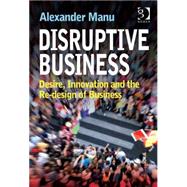Disruptive Business: Desire, Innovation and the Re-design of Business
, by Manu,Alexander- ISBN: 9780566092404 | 0566092409
- Cover: Hardcover
- Copyright: 8/28/2010
Innovation is in a crisis of identity. Crowd sourced massive innovation is a reality that calls for the redefinition of what 'innovation' is, in the new context of an empowered and participatory user. At the level of the corporation, we need focus, incentives, tools, scope and precision in the language surrounding innovation, so all stakeholders are on the same page. We also need to get rid of some old thinking and old labels. Seven critical aspects around innovation outcomes and business design are explored: 1. The Challenge: Innovation is an outcome, not a process. Organizations fancy the latter because processes can be managed, and this is what organizations are good at. This hides the lack of expertise - and mindset - in creating and managing a culture of innovativeness, and an organizational ecology populated by innovation 'connoisseurs'. The management of the outcome is much different than the management of the process, and this is where definitions are important: innovation is an outcome achieved by a multiplicity of processes, some including imagination, creativity or simply repetitive tasks. 2. Ethos: Innovation has always been pre-competitive. While our first innovations were competitive - we needed to survive and compete with the other animals - humanity moved quickly to pre competitive innovation. The concept of comfort is one of these innovations. Pillows have nothing to do with need or competitive drive. Innovation for competitive advantage encourages an Innovation Problem Framework - the starting point of a process where the limits for what can be achieved are already defined. This model is no longer sufficient or desirable. This type of innovation does not create a strategic advantage, but mitigates a weak position. 3. Labels: There is no 'Disruptive Innovation'. This label has misstated the nature of innovation. What is disruptive is technologies and emergent behaviours. When behaviour engages technology in an innovation outcome, we have a disruptive business model. 4. Purpose: Innovation creates culture, not products. Take Apple again: they are not innovating technology, they are innovating ways of engagement with technology for new desired and beneficial outcomes; ways to make us happy. 5. Roots: Innovation is rooted in Desire, not need. Organizations need to reconnect with the core of makes us human: desire. Desire not in the hedonistic sense, but in the higher motivational sense of the desire to become better through education, literacy, tools, systems and services, all provisions for the achievement of our higher goals. A company's ability to meet this desire directly contributes to the success of their products and services in the marketplace. As desire is constant, innovation is constant; business is the variable. 6. Ecology: A New Mindset for Innovativeness. Where can we find the competence and ability to innovate at 2.0 speed and for 2.0 behaviour? In the corporate ecosystem most likely to encourage the free flow of ideas capable to generate new revenue models. The challenge is that of creating a culture in which platforms for the exploration of possibility are encouraged, funded and free of the day to day metrics of the organization, balancing risk, ambiguity, courage and imagination with a pragmatic business ambition in a timely manner. 7. Aptitude and Attitude. Innovation is practice before theory. Innovation theorists are rarely innovation practitioners; this creates a disconnect between theory and practice and hurts the teaching and the management of innovation. The successful innovation led companies are run by innovation practitioners: Steve Jobs at Apple, Sergey Brin at Google. Why is practice so important? Because innovation is a percept not a concept. It has to be felt and experienced in order for the outcome to be successfully managed. Innovation as percept is fundamental to all stakeholders: to the innovator, to the user, to the critic and to the man






